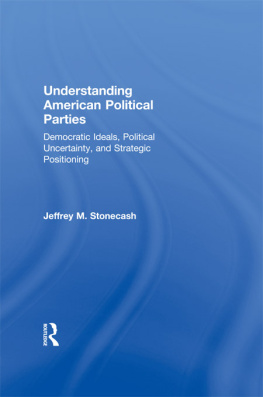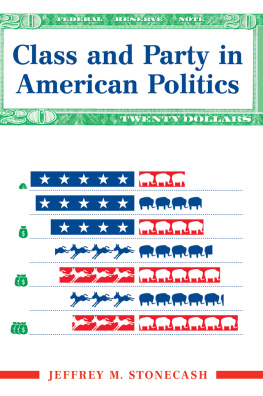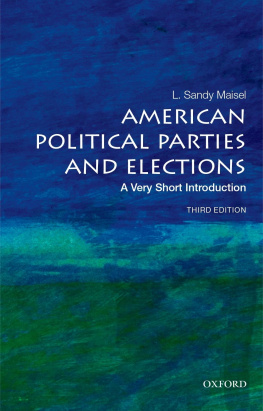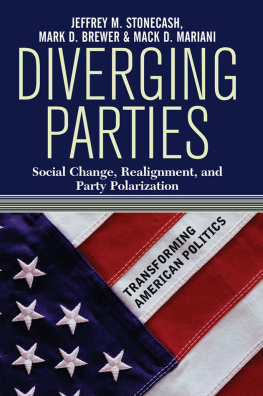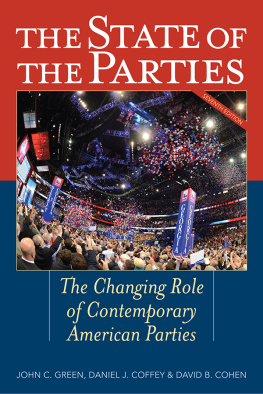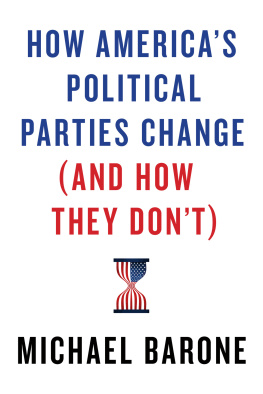Understanding American Political Parties
How do parties respond to the electorate and craft winning strategies? In the abstract parties are the vehicles to make democracy work, but it is often difficult to see the process working as well as we think it might. Indeed, voters often struggle to see parties as the valuable vehicles of representation that so many academics describe. There is a clear discrepancy between the ideal expressed in many textbooks and the reality that we see playing out in politics.
Noted scholar Jeffrey Stonecash gives us a big picture analysis that helps us understand what is happening in contemporary party politics. He explains that parties behave the way they do because of existing political conditions and how parties adapt to those conditions as they prepare for the next election. Parties are unsure whether realignment has stabilized and just what issues brought them their current base. Does a majority support their positions and how are they to react to ongoing social change? Is the electorate paying attention, and can parties get a clear message to those voters? This book focuses on the challenges parties face in preparing for future elections while seeking to cope with current conditions. This coping leads to indecisiveness of positioning, simplification of issues, repetition of messages, and efforts to disparage the reputation of the opposing party. Stonecash sheds much needed light on why parties engage in the practices that frustrate so many Americans.
Jeffrey M. Stonecash is Maxwell Professor of Political Science at Syracuse University. His research focuses on political parties, realignment of their electoral bases, and the impact of changing alignments on the nature of policy debates.
Understanding American Political Parties
Democratic Ideals, Political Uncertainty and Strategic Positioning
Jeffrey M. Stonecash
Maxwell School, Syracuse University
First published 2013
by Routledge
711 Third Avenue, New York, NY 10017
Simultaneously published in the UK
by Routledge
2 Park Square, Milton Park, Abingdon, Oxon OX14 4RN
Routledge is an imprint of the Taylor & Francis Group, an informa business
2013 Taylor & Francis
The right of Jeffrey M. Stonecash to be identified as author of this work has been asserted by him in accordance with sections 77 and 78 of the Copyright, Designs and Patents Act 1988.
All rights reserved. No part of this book may be reprinted or reproduced or utilised in any form or by any electronic, mechanical, or other means, now known or hereafter invented, including photocopying and recording, or in any information storage or retrieval system, without permission in writing from the publishers.
Trademark notice : Product or corporate names may be trademarks or registered trademarks, and are used only for identification and explanation without intent to infringe.
Library of Congress Cataloging in Publication Data
Stonecash, Jeffrey M.
Understanding American political parties: democratic ideals, political uncertainty and strategic positioning/Jeffrey M. Stonecash.
p. cm.
Includes bibliographical references.
1. Political partiesUnited States. I. Title.
JK2265.S75 2012
324.273dc23
2012012711
ISBN: 978-0-415-50844-5 (hbk)
ISBN: 978-0-415-50843-8 (pbk)
ISBN: 978-0-203-12344-7 (ebk)
Typeset in Bembo
by Florence Production, Stoodleigh, Devon
Contents
Preface
We have an ideal about the role political parties should play in American democracy. They are expected to present alternatives and organize and lead policy debates. The electorate then reacts and renders its judgment, providing feedback to elected party members as they move to considering policy choices. While that ideal is regularly presented in textbooks, much of the American public has serious doubts about how well parties fulfill this ideal. They see simplistic proposals, negative ads, squabbling, and confrontations in Congress that do not seem to focus on and resolve problems. The reality does not appear to meet the ideal. The concern of this book is why does that seeming discrepancy exist? Why do parties engage in behaviors we dont like?
The answer involves the political conditions that parties face as they approach upcoming elections and seek a majority. These conditions and the resulting uncertainty create behaviors many do not like. We have many excellent studies that interpret what has happened in the past and how we got to where we are. They track the concerns and policy positions of the parties over time and how electoral groups change their partisan support in response. As valuable as those studies are, they miss something essential to understanding how American political parties see the political world and act. Studies invariably look backward, trying to interpret why some trends have happened.
Party politicians also look back to try to understand how they got to where they are, but they are enormously preoccupied with assessing existing conditions and deciding what positions they should take as the next election approaches. They must decide what issues and positions might help them connect with enough voters to achieve a majority. They draw upon the past, but they have to focus on what will work for the future.
The conditions they face are: awareness that considerable change has occurred over time in who is voting for each party; uncertainty whether this change is over; diverse interpretations of what brought them the base they have; an ongoing lack of a majority; continuing social change that they are uncertain how to react to; a disengaged electorate; and, a fragmented media that may not convey the positions the parties stake out. These conditions prompt strategies and behaviors that much of the electorate does not like, but that parties see as a necessary part of coping with the conditions they face.
The following chapters review the conditions just listed and the behaviors that each prompts. The focus is on what party leaders and members face and how they are likely to see the political context within which they operate. It is an uncertain world and parties operate with much more of a trial and error approach than many of the historical interpretative analyses sometimes suggest. If this book has virtues, they are approaching the political world from the perspective of party leaders thinking about future elections and explaining why they behave the way they do.
Ultimately the important question is whether, despite these behaviors, the parties play out the ideal roles in democracy that we expect. That will be taken up at the end.
Part I
American Political Parties
Democratic Ideals and Doubts
The rise of political parties is indubitably one of the principal distinguishing marks of modern government. The parties have been the makers of democratic government. political parties created democracy and modern democracy is unthinkable save in terms of the parties.
If I could not go to heaven but with a party, I would not go there at all Thomas Jefferson.
The two parties cant come to a consensus even when the solution is obvious.
A majority of Americans say its more important that political leaders in Washington compromise in order to get things done, rather than stick to their beliefs, even as Congress heads for a government shutdown for the second time in less than two months because of partisan disagreements.

